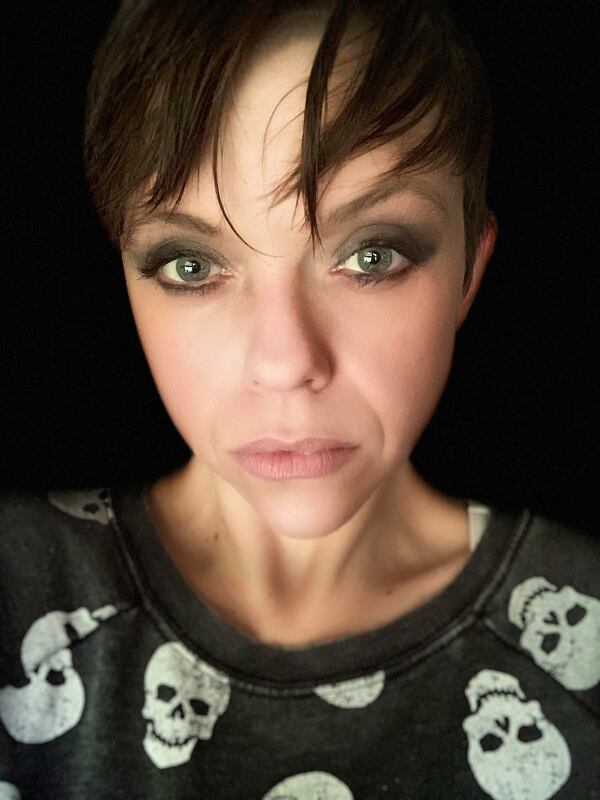 Kelli Age 4 Kelli Age 4 I'm depressed. I think that is the first time I have ever admitted publicly that I am truly depressed at the time that I am depressed. I've been prone to depression since I was a child. I can pinpoint the years of my life when depression ruled the day. Yet, as I have gotten older I have found myself dealing with it on a day to day basis far less. I thought for a good long while that I had beaten it. I thought that the most I'd feel were moments of sadness, frustration, or let down. I didn't think that depression would come again. Admitting that one is depressed can have so many negative repercussions to how one is perceived by their peers. While there are many difficult aspects to living with depression, people who are depressed should not be ruled out as productive, interesting, and lovable people. Assuming that someone who is depressed is ungrateful, lazy, selfish, dramatic, or emotionally stunted or overstimulated is like saying someone who has diabetes is also all of these things. There may be a personal component to having an illness like depression or diabetes that is often chronic, but science tells us that genetics also play a strong factor in our predisposition to developing it. There is no one to blame for depression. People who are depressed should not be counted out. Currently, I'm struggling with the compulsion I feel to do things "properly." It has taken over so many aspects of my life that I wake up every morning with an intense pressure to do things as prescribed by the text I'm reading, the mentor I have chosen, the philosophy of whatever group label I have dove into for support. I'm overwhelmed by all of these things I've told myself that I have to do to be successful that when there just isn't enough time in the day to research educational philosophy, I think about the laundry list of things to do in the day while I'm supposed to be focusing on God during meditation, or I fight the urge to let my toddler watch some TV so we can peacefully complete our school lessons, I feel incredibly guilty and as if all the effort I've put forth to do this mother and homemaker thing well has just been washed down the drain. The day is a loss. I've failed my children. I've failed my husband. I've ceased to matter in the larger scheme of things. I'm just a failing housewife. I know. It's irrational. I completely understand that and recognize it. Does that make a difference in battling these feelings? Mostly not. However, it is a starting point. The task before me is learning to let go of these labels, rules, and prescriptions and adopt what is truly a fit for me and my family. I have to learn that the effort is as important if not more so than the result. I have to stop the thoughts of failure. I have to accept that the me that God created, the joy I feel when allowing myself to just be who I am without apology, is enough for me and my family. It's so easy to feel the burden and guilt for not being content and happy. We are bombarded by the positive thinking movement (which I believe has much merit) saying that happiness is a choice. It makes it seem so simple to choose to be happy and content. They say begin by being grateful for what you have, as if someone who isn't happy is an ungrateful person not recognizing the many things they are blessed with every day. We can't simply make a list of what we are grateful for and suddenly expect to be happy or not depressed. Gratitude can be fully lived and recognized while in deep depression. Every day is a new day even when depressed. Often, while depressed, facing the day at all is something that makes you feel dread. When you measure yourself against your peers and their accomplishments, it is easy to feel like you aren't doing enough. Motherhood is a lonely place many times. I've written that before. I long to have a voice in things that matter to adults. Many of my feminist friends (and no I'm not saying that I'm not a feminist) would say that what I'm doing as a stay at home, homeschooling, wife and mother is a choice that I can un-choose. Probably, a lot of those who would say that aren't mothers yet or have chosen not to be. When another person's life and opportunities in that life become your responsibility, choices become infinitely more complicated. I could ask for the greater world to become more interested in mothers and all that we accomplish in a day, but in our culture of leisure,consumer values, and immense access to information about our world, domestic life is pretty boring. Raising children becomes something that isn't our "work", but the thing we do as we do our real work, or depending on arrangements, when we have completed our real work for the day. I know to some, I'm wasting my mind by not taking on some "meaningful" work. Does it sound like I resent that? Perhaps I do. Perhaps there's a hint of jealousy. Perhaps I just want to eat my cake. So, from this place in my life, I have a lot of hard work to do. I'm someone who believes I was born with all I need to be happy, content, and prosperous. I believe we are all important. We are born children of the Most High. We are wanted by God. Planned by God. That is no small thing. What that tells me is there is the possibility of Light. I first want to accept where I am, speak/write my experience, and then begin to adopt the practice of letting go and feeling my way rather than using unbalanced intellect and sacrificial willing to obtain the Ideal.
1 Comment
Laura
12/30/2014 02:40:29 am
I love this post, Kelli. I've done some work with depression and grief (my own and others'), and every time I come back to a firm belief that depression is a sacred time. Not unlike labor pains in some way, I guess. I think when depressed we are being called inward, into the dark depths of our soul which offers few landmarks for comfort. Sometimes we can't even find the walls deep in there - partly because we've been detached from the part of our soul that we're being called to for so long, and partly because it's this vast space that must necessarily be open and dark in order to contain the Spirit - and it becomes a very lonely, dark, lost experience. But we are being called into it and called to respect it, give it time, and explore what looks for now to our eyes like nothingness. St. John of the Cross described the dark night of the soul in a similar way. He said our darkest periods happen for the same reason that looking at the sun blinds us. In those moments, God has turned God's face directly to us and is gazing right at us. When we dare to gaze back, what we see looks like darkness instead of light. It's too big for us to handle or understand. But those moments are packed with calling if we pause to let ourselves be there, in the midst of darkness, and let our eyes get used to what we're being called to see. Something new or old in us waiting to be birthed. Light that has always been there that we've never been able to see clearly. In our culture, entering into depression, respecting it, and taking time with it are not encouraged. But I think if we treat it as something sacred (like when the Hebrews wandered in the wilderness) and give it time to see what it is telling us, we come out on the other side different. I just started a book by Sue Monk Kidd called "When the Heart Waits." The first chapter was all about her period of depression and she spent a lot of time using pregnancy metaphors and rich imagery of butterflies in the chrysalis, waiting in the dark to be born new, doing the work of growing on the inside when on the outside it looks like nothing. I wish I'd had this book during my own periods of depression, at least as long as it stays as good as the first chapter has been. I hope your eyes get used to the light that is bathing you right now and that, on the other side of this difficult work, you see yourself more closely to how God sees you.
Reply
Leave a Reply. |
AuthorKelli Hansel Haywood is the mother of three daughters living in the mountains of southeastern Kentucky. She is a writer, weightlifter, yoga and movement instructor, chakra reader, and Reiki practitioner. Categories
All
Archives
September 2021
|

 RSS Feed
RSS Feed